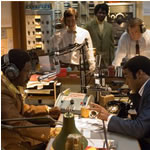Talk to Me (Kasi Lemmons)
Ralph Waldo “Petey” Greene Jr. (Don Cheadle) was a man with a big, beautiful mouth and he knew how to use it. Honing his DJ skills within the bars of confinement, fate knew he had a future in broadcasting and so did he. Petey was at the right place, at the right time, with destiny calling on his unique energy that project the voice of the people, for the people.
“Talk to Me” is a fantastic look into the story of this real, larger-than-life icon that had a huge social impact on people of all walks of life and professions during the turbulent ‘60s, spotlighting his tenacious wit, street style amped to 11, and his moments of greatness where inspiration came from the heart and soul.
During his incarceration, Petey happens to meet a radio suit by the name of Dewey Hughes (Chiwetel Ejiofor), who was visiting his own brother Milo in the prison. The prison happens to have their version of a radio show with Petey as the star, and brother Milo is excited for Dewey to hear this talent behind the mic and behind bars, but all Dewey can hear is the category of convict, or as he says to Petey as he leaves the prison, a “miscreant.”
Petey manages to conceive a plan to get released from prison early (which is one of many hilarious scenes in the film), showing up at WOL-AM where Dewey works, demanding a job.
This is where we see another example where behind every good man is a strong, smart, and vivacious woman which is in this case, Vernell Watson (Taraji P. Henson) who also plays the part of Petey’s devout girlfriend and muse. Her light shines just as bright as her counterpart, but with a different kind of soul and tenacity that plays ten times stronger than Beyonce’s similar attempt at Foxxy Cleopatra.
At first Dewey is mortified that the flamboyant and boisterous couple is even in the radio station, kicking the dust up so to speak, and gets them to leave. But the story, of course, doesn’t end there. This is the ‘60s after all, and when you don’t agree with something you let your voice be known. Starting with the power of one, Petey protests outside of the station and Dewey takes it all in stride. But he underestimates this “miscreant” and Petey’s ability to lead the pack, and before you know it, the numbers of people in the protest circle grows to a point where Dewey has no choice but to give him his time behind the mic.
After a warm up period so to speak, Petey is able to command control by just being real and telling it like it is, and his real self is typically more than people can handle. Taking a line from another movie, “You can handle the truth.”
But it is this power that draws people to him and makes for the funniest moment in this film. The writing is as street smart and the lines fly fast and furious, with the timing of each is crafted with perfection. The audience is rolling in their chairs and so was I, but this is not a comedy in the traditional sense. It is life as it was for these folks, for the culture at that time, and the brazen acts and ways Petey saw the world is what made us laugh.
We also learn that Petey is not the only one with skills, and that underneath Dewey’s “Mr. Tibbs” persona there is a man from the projects who decided he wanted to go in a different direction with his life, but still retains all his street cred in the process.
Between the “no he di-int” moments there are many poignant ones, which are of course, followed up with some smart ass comment. These times typically occur between Petey and Dewey, where their friendship is not only based on a mutual respect for each other’s talents, but on the mutual ying and yang of their bond, where Petey is able to say the things that Dewey is afraid to say, and Dewey is able to do the things the Petey is afraid to do.
There are also moment where we learn more about how Dewey built his dream life in his mind, and how he was living vicariously through the talents of his friend to make those dreams come true.
The next day after seeing this film, I wanted to see it again and again. The punches with the writing is non-stop, which sometimes makes it hard to get it all in 100% because everyone is laughing so much. But more than anything, I was hungering for Don Cheadle’s character to be real and alive today. To say the things that so many of us are afraid to say because of the state of today’s culture, which has been largely affected by today’s administration. We saw what happened to Bill Mahar when he spoke his mind, or to legendary journalist when he happen to report a story that put this president of ours in a bad light, or even what recently happened to Warren Churchill.
It’s sad to think that our ability to speak our mind hasn’t gotten any better in the last 40 years, and if anything, it’s gone backwards in time. Well, one of Petey’s songs of inspiration was Sam Cooke’s “Change is Gonna Come” and slowly but surely, we are taking things back. So just maybe, “Talk To Me” will leave its mark and inspire us to be more real and speak our minds, while also making us laugh our asses off.

